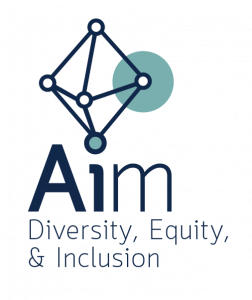Presented By: Center for Academic Innovation
Academic Innovation at Michigan (AIM) for DEI
Tandem: Supporting Students Working in Diverse Teams

Join us on Friday, November 1 from 12:00 p.m. to 1:30 p.m. in the Ehrlicher Room at North Quad for AIM for DEI. The team for the Academic Innovation software tool, Tandem, will give a presentation. Lunch will be provided. Please register for this event if you plan to attend.
Abstract:
Team-based learning is an effective pedagogy that has the potential to increase student learning and motivation, but it can also sometimes lead to inequitable or even toxic experiences. We know that working well on diverse teams is an important skill, but generic messages addressing cultural humility and pro-teamwork behaviors often fall short.
Tandem is a web-based, customizable tool that provides research-based instruction and support for student teams at scale. Messages informed by an assessment of individuals’ and teams’ needs allow for brief “coaching” that can encourage students to (re)consider teammates’ perspectives and redirect maladaptive team patterns. Short lessons including opportunities for applying ideas to current teamwork experiences via reflection are pushed out regularly throughout the semester. Example lesson topics include: imposter syndrome, equality in group conversation, and tools for supporting collaboration.
Tandem can identify problematic DEI-related team issues and call them out for faculty. For example, in the first year engineering course we co-teach, women sometimes complete more of the project management and communication work, and men sometimes do more of the physical building. That pattern is not meaningful if it only happens with a single team: many characteristics of the individuals on the team affect who does which tasks, and gender is certainly not the sole determinant. However, an instructor might wish to know about such patterns at the class level, or even in the discipline more generally, and Tandem includes algorithms to identify such information.
Tandem Team Bios:
Laura K. Alford is a Lecturer and Research Investigator in the Naval Architecture & Marine Engineering Department in the College of Engineering. She researches ways to use data-informed analysis of students' performance and perceptions of classroom environment to support DEI-based curricula improvements.
Robin Fowler is a Lecturer in the Technical Communication in the College of Engineering. She enjoys serving as a "communication coach" to students throughout the curriculum, and she's especially excited to work with first year and senior students, as well as engineering project teams, as they navigate the more open-ended communication decisions involved in describing the products of open-ended design scenarios. She researches student experiences in team-based pedagogy.
Stephanie Sheffield is a Lecturer in Technical Communication in the College of Engineering. She currently teaches senior-level courses in Biomedical Engineering, Chemical Engineering, and Electrical Engineering & Computer Science. Her research interests are focused on better understanding and improving the learning experiences of the students in her courses, with current emphasis on the ways in which students engage with online resources and student attitudes towards working in teams in DBTC courses.
AIM for DEI is an all new event series hosted by the Center for Academic Innovation that will explore how technology and innovation impact the inclusivity and equity of the learning experiences we create for our residential, online and global learners.
Abstract:
Team-based learning is an effective pedagogy that has the potential to increase student learning and motivation, but it can also sometimes lead to inequitable or even toxic experiences. We know that working well on diverse teams is an important skill, but generic messages addressing cultural humility and pro-teamwork behaviors often fall short.
Tandem is a web-based, customizable tool that provides research-based instruction and support for student teams at scale. Messages informed by an assessment of individuals’ and teams’ needs allow for brief “coaching” that can encourage students to (re)consider teammates’ perspectives and redirect maladaptive team patterns. Short lessons including opportunities for applying ideas to current teamwork experiences via reflection are pushed out regularly throughout the semester. Example lesson topics include: imposter syndrome, equality in group conversation, and tools for supporting collaboration.
Tandem can identify problematic DEI-related team issues and call them out for faculty. For example, in the first year engineering course we co-teach, women sometimes complete more of the project management and communication work, and men sometimes do more of the physical building. That pattern is not meaningful if it only happens with a single team: many characteristics of the individuals on the team affect who does which tasks, and gender is certainly not the sole determinant. However, an instructor might wish to know about such patterns at the class level, or even in the discipline more generally, and Tandem includes algorithms to identify such information.
Tandem Team Bios:
Laura K. Alford is a Lecturer and Research Investigator in the Naval Architecture & Marine Engineering Department in the College of Engineering. She researches ways to use data-informed analysis of students' performance and perceptions of classroom environment to support DEI-based curricula improvements.
Robin Fowler is a Lecturer in the Technical Communication in the College of Engineering. She enjoys serving as a "communication coach" to students throughout the curriculum, and she's especially excited to work with first year and senior students, as well as engineering project teams, as they navigate the more open-ended communication decisions involved in describing the products of open-ended design scenarios. She researches student experiences in team-based pedagogy.
Stephanie Sheffield is a Lecturer in Technical Communication in the College of Engineering. She currently teaches senior-level courses in Biomedical Engineering, Chemical Engineering, and Electrical Engineering & Computer Science. Her research interests are focused on better understanding and improving the learning experiences of the students in her courses, with current emphasis on the ways in which students engage with online resources and student attitudes towards working in teams in DBTC courses.
AIM for DEI is an all new event series hosted by the Center for Academic Innovation that will explore how technology and innovation impact the inclusivity and equity of the learning experiences we create for our residential, online and global learners.